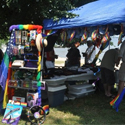Living
Down by the seashore
Saturday’s Chesapeake Pride offers laid back vibe, small-town feel

Gay life in small towns, as many have noted, can be tough.
Kim Hinken lives in Edgewater, Md., near Annapolis, and finds community through church and an e-mail group.
“We have happy hours once a month,” she says. “I send out e-mail blasts to everybody on our list and invite them and we meet at a bar in Annapolis. Not a gay bar, because there aren’t any, but just any old bar. If it feels comfortable, we’ll go back. But it is difficult. Very difficult. I can’t imagine being a teen here.”
There is a glimmer of LGBT fabulousness, though. Once a year about 500 — some from D.C. and Baltimore — gather for Chesapeake Pride slated for Saturday from noon to 6 p.m. at Mayo Beach Park in Edgewater, Md., just south of Annapolis. The main draw is for gays in Maryland’s Chesapeake Bay/Annapolis region to gather and celebrate but gays from the larger region — it’s about 35 miles from D.C. — sometimes attend because it’s such a contrast to Capital Pride.
“It’s much more intimate and because it’s smaller, it’s more accepting and manageable,” says Rev. Wayne Schwandt, pastor of the mostly gay Metropolitan Community Church of the Chesapeake, a small parish of about 25 that meets on Sunday evenings. “I think a lot of people are getting to the point where they find Capital Pride overwhelming but this is much easier to navigate and you can virtually talk to everybody who’s there … it feels sort of like Capital Pride did in 1975 when Deacon [Maccubbin] started it and it was just a block party.”
Schwandt and a group of volunteers started Chesapeake Pride 11 years ago. The Chesapeake Pride Planning Committee consists mostly of MCC Chesapeake members who plan the annual event. It’s the only Maryland Pride event besides Baltimore Pride. About 550 attended last year and it continues to grow each year. Gays from D.C. and Baltimore are welcome but the event was conceived to give the LGBT community in Anne Arundel, St. Mary’s and Calvert counties, where there are no gay bars and a dearth of gay events, access to an LGBT festival.
Organizers say Mayo Beach Park makes for a great Pride setting. Swimsuits are encouraged. Bands play nearby and a drag show is held under an indoor pavilion with large sliding doors on all sides. The committee rents the park for the day. A classic car show, kids’ area and face painting are again on this year’s schedule. Drag performer Stormy Vain will emcee for the fourth consecutive year. About 40 booth vendors have registered, again a record.
Chesapeake Pride is free but $5 donations are requested. The group usually breaks even despite the approximately $10,000 Hinken guesses it costs to produce. A few years there has been a slight profit. It’s always given to a local gay-straight alliance or LGBT charity if any money, even a few hundred dollars, is left over. Sponsors and donations help.
“It’s a very laid back, very casual atmosphere,” Hinken says. “Because it’s in a park setting right on the bay, I think it gives the kind of atmosphere where you feel you can really be yourself. It’s very family friendly, there’s a kids area. They love the water and the beach and the playground. It’s a great place for families to come for the day.”
Parking is free and abundant in two nearby fields. And a bathhouse area gives revelers a chance to shower before departing.
“Not that kind of bathhouse,” Hinken says with a laugh.
Chesapeake Pride
Mayo Beach Park on the Chesapeake Bay
Edgewater, Md.
Saturday from noon to 6 p.m.
$5 donation
chesapeakepridefestival.org

Did you melt like the Wicked Witch of the West this week?
As summer temperatures rise, keeping your home or apartment cool during a heat wave can become both a comfort issue and a financial challenge. One of the most effective ways to keep a home cool is to prevent heat from entering in the first place. Sunlight streaming through windows can significantly raise indoor temperatures. Consider the following solutions:
• Close blinds or curtains during the hottest parts of the day. Blackout curtains or thermal drapes can reduce heat gain by up to 30%.
• Install reflective window films to block UV rays and reduce solar heat without sacrificing natural light.
• Use outdoor shading solutions such as awnings (yes, the ones you removed because they were “dated”) and shutters to limit direct sunlight.
Fans are a cost-effective way to circulate air and create a wind-chill effect that makes rooms feel cooler.
• Ceiling fans should rotate counterclockwise in the summer to push cool air down.
• Box fans or oscillating fans can be placed near windows to pull in cooler evening air or push hot air out.
• Create a cross-breeze by opening windows on opposite sides of your home and positioning fans to direct airflow through the space.
• For an extra cooling effect, place a bowl of ice or a frozen water bottle in front of a fan to circulate chilled air.
To optimize natural ventilation, open windows early in the morning or late in the evening when outdoor temperatures drop. This allows cooler air to flow in and helps ventilate heat that built up during the day.
Appliances and electronics generate a surprising amount of heat. To reduce indoor temperatures:
• Avoid using the oven or stove during the day; opt for no-cook meals, microwave cooking, or grilling outside.
• Run heat-producing appliances like dishwashers and clothes dryers in the early morning or late evening.
• Unplug electronics when not in use, as even standby power can add heat to your space.
• Switching to energy-efficient LED lightbulbs can also reduce ambient heat compared to incandescent lighting.
If you do use an air conditioner, maximize its effectiveness by:
• Setting it to a reasonable temperature—around 76–78°F when you’re home and higher when you’re away.
• Cleaning or replacing filters regularly to maintain airflow and efficiency.
• Sealing gaps around doors and windows to prevent cool air from escaping. (Didn’t we all have a parent who said, “Close the door. You’re letting all the cool out?”)
• Using a programmable thermostat to optimize cooling schedules and reduce energy use.
If it is not cost-prohibitive, adding insulation in attics and walls can greatly reduce heat transfer. Solar panels that reflect heat can also help, as well as offset the cost of their installation. Adding weatherstripping around doors and windows, sealing cracks, and using door sweeps can make a significant difference in keeping heat out and cool air in.
Natural and eco-conscious methods can also help cool your home.
• Snake plants, ferns, or rubber trees can improve air quality and slightly cool the air through transpiration.
• White or reflective roof paint can reduce roof temperatures significantly.
• Cooling mats or bedding can make sleeping more comfortable without cranking up the A/C.
For renters or those who can’t make permanent modifications, there are still plenty of ways to keep cool.
• Use portable fans and A/C units instead of built-in systems, making sure they are the correct size for your space.
• Removable window film or static cling tinting can reflect heat without violating your lease.
• Install tension rod curtains or temporary blackout panels instead of hardware-mounted window coverings.
• Add draft blockers and weatherstripping tape that can be applied and removed without damage.
• Cover floors with light-colored rugs to reflect heat rather than absorb it.
• If allowed, use temporary adhesive hooks to hang reflective materials or light-filtering fabrics over windows.
Even if your space is warm, you can still take steps to help your body stay cool.
• Wear light, breathable fabrics like cotton or linen.
• Stay hydrated and avoid caffeine or alcohol during peak heat hours.
• Take cool showers or use damp cloths on your neck and wrists to bring your body temperature down.
Keeping your home or apartment cool in the summer doesn’t have to be expensive or energy-intensive. With a few adjustments such as blocking sunlight, optimizing airflow, using fans effectively, and making renter-friendly upgrades, you can create a more comfortable indoor environment while keeping energy bills in check.
Valerie M. Blake is a licensed Associate Broker in D.C., Maryland, and Virginia with RLAH @properties. Call or text her at 202-246-8602, email her at DCHomeQuest.com, or follow her on Facebook at TheRealst8ofAffairs.
Real Estate
The world’s on fire and D.C. is on sale (sort of)
Prices are up, but then again, nothing makes sense anymore

ICE is disappearing people, revered government agencies are shuttering, and who knows if we’ll be in World War III next week? But can you believe prices in D.C. are actually still up 6.3% since last year? It doesn’t make sense, and perhaps that does make sense, because nothing seems to make any sense any more.
That said, there are some parts of our market that are truly suffering. The interest rates, which have been up, up, up for about four years now, are the ongoing rain on our market’s military parade. Combine that with 75,000 federal employees taking a buyout nationwide, and DOGE cuts eliminating around 40,000 federal jobs in the District (per estimates by the D.C. CFO), not to mention thousands of other job losses in non-governmental organizations due to funding and program cuts, and you’ve got a case of uncertainty, and downright unaffordability in the pool of otherwise would-be buyers.
This has had a marked impact on properties that starter-home buyers and low- to mid-level employees would otherwise buy, most notably condominium and cooperative apartment units. These properties have already slowed in our market thanks to the profound impact that higher interest rates have had on their monthly carrying costs—pair that with job insecurity, and a lot of condos are proving to be very difficult to sell indeed.
So how is the average sale price up in our market?
The increase is almost entirely due to the resounding strength of the single-family home market, especially in upper Northwest D.C., where it is still quite common to see bidding wars, even on properties pushing past the $3M mark. It seems that buyers in that echelon are less impacted by a few percentage points in the interest rate, and less concerned about their job security. Notably, those buyers are often married with children and have an absolute need for more space, must stay in the area due to one spouse’s job, or the kid’s friend group, regardless of whether the cost of owning is thousands of dollars more per month than it would have been in 2020 or 2021. The continued appreciation in these neighborhoods defies imagination.
So, what to do if you are not one of those lucky enough to be shopping for a $3M home? The short answer: wait. If you want more space, rent your current place out and learn the joys of being a landlord while someone else pays your mortgage. Need the equity from your current home to buy your next place? Get a home equity line of credit, or loan, and pull the equity out of your current place to buy the next one. Or—and I have never recommended this before in 21 years of being a Realtor—rent for a few years. Sure, I’d love to list and sell your condo so you can climb the real estate ladder, but it might just be a waste of time, money or both if you could just ride out this storm and sell in a DOGE-less future.
All this said, there are some condos that seem to be immune from this recent negative news. Anecdotally, it feels like it’s the truly special ones that do just fine no matter the market. Our recent listing in Capitol Hill had a view from every one of its 15 windows of the Supreme Court. Sold in five days with six offers. Another condo was on the top two floors of a townhouse and had the coolest black wood floors that gleamed like a grand piano. Sold in four days at full price.
So, all is not for naught if you have a condo or home in an area that people want to be in, with nice space, light, amenities and a certain je ne sais quois. And, as long as we have a democracy in a few years, my experience says our market will be back, stronger than ever, really soon.
David Bediz is a Realtor and mortgage loan broker for the Bediz Group LLC and Home Starts Here, LLC. Reach him at [email protected].

In this corner, there’s the Genesis QV70, newly updated and full of glitzy gizmos. And in the opposing corner, there’s the Lexus NX, a fan fave known for comfort and reliability.
Both are strong contenders. Both have proven to be equally adept at bobbing and weaving through traffic. And both can go toe to toe with pricier competitors.
And yet, what would happen when they sparred against each other? Here’s your ringside seat to find out.
GENESIS QV70

$50,000
MPG: 22 city/28 highway
0 to 60 mph: 5.9 seconds
Cargo space: 28.9 cu. ft.
PROS: Stylish. Good value. Lots of standard amenities.
CONS: So-so fuel economy. Quirky dash controls.
IN A NUTSHELL: When it comes to speed, the Genesis QV70 is faster on its feet than the Lexus NX. Neither of these crossover SUVs is a lightweight, but the QV70 offers more potent powerplants—including an all-electric version that zips from 0 to 60 mph in just 3.8 seconds. In other words, Porsche Macan S territory.
The two gas-powered options—a four-cylinder turbo and twin-turbo V6—also got my blood pumping. So did the velvetlike suspension mixed with deft handling and stop-on-a-dime braking. But this adrenaline rush comes at a cost: sacrificing fuel economy.
As for the automaker’s design philosophy—“athletic elegance”—it’s on full display here: an oversized grille inspired by the Genesis emblem, the dramatically arcing silhouette, and those distinct quad headlights and taillights. It’s not easy to stand out when 25% of all vehicles sold in the U.S. are compact crossovers, so kudos to the QV70 for being such a head-turner.
The mod-yet-minimalist styling carries over to the cabin, with its high-quality materials: real-wood accents, soft-touch plastics and a tasteful glass shift knob. New this year is a sweeping 27-inch dashboard monitor, which houses the gauge cluster and infotainment touchscreen. Alas, this display is positioned a bit far from the driver (though I must admit reaching for it did help stretch a few tight back muscles).
Instead of being a costly extra, this gigantic monitor comes standard. So do synthetic leathers seats, nine-speaker stereo, smartphone/wireless connectivity, hands-free liftgate, tons of safety gear and more. Options include a panoramic sunroof, three-zone climate control, 16-speaker Bang & Olufsen audio, synthetic suede headliner, sound-reducing rear windows, automated parking and other goodies.
What’s the score so far? Despite some minor quibbles, the Genesis QV70 is a worthy challenger that pulls no punches.
LEXUS NX

$43,000
MPG: 26 city/33 highway
0 to 60 mph: 8.2 seconds
Cargo space: 22.7 cu. ft.
PROS: Fuel efficient. Comfy seats. Rock-solid reliability.
CONS: Pokey base model. Limited rear storage.
IN A NUTSHELL: Sure, the Lexus NX isn’t as speedy as the Genesis QV70. But, as with the tortoise and the hare, sometimes slow and steady wins the race. And really, it’s only the entry-level NX that feels sluggish, such as when trying to quickly merge into freeway traffic.
Other trim levels, including two hybrid options, are just fine. And no matter the engine choice, the counterpunch here is that these vehicles get better gas mileage: 20% higher fuel economy than in either the four-cylinder or V6 in the Genesis. The two NX hybrids are even more green, with the high-end plug-in version able to travel up to 37 miles on electric power alone. One downside: There is no all-electric NX—well, at least not yet.
As with parent-company Toyota, Lexus offers stellar vehicle reliability—often ranked No. 1 in dependability and crash-test surveys year after year. Lexus vehicles generally hold their value better than Genesis, because this newer brand has a shorter history. Lexus also has a larger dealer network, though the number of Genesis dealerships is growing.
But when it comes to cargo space, the NX is about two inches shorter and narrower than the QV70, which has more stowage area. And Genesis handling is sportier, though the Lexus feels sure and well-grounded.
Luxe interior amenities are basically the same in both vehicles. But interior styling in the QV70 is trendy, while the NX is more understated. In other words, a choice between sassy and classy.
This is a very competitive vehicle segment, with Euro models like the Audi Q5, BMW X3 and Mercedes GLC also duking it out in what seems like a clash of the titans.
But as for the Genesis QX70 or Lexus NX, which is the winner? For me, both are real knockouts—so I’d call it a draw.












